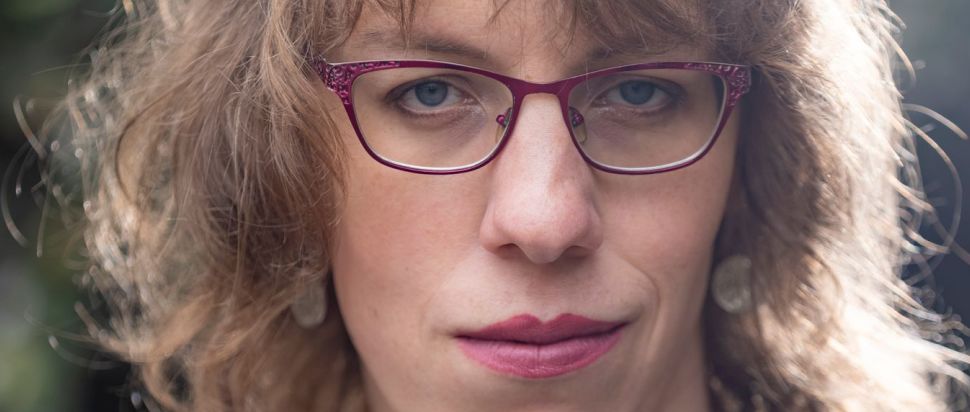Harry Josephine Giles on Orkney sci-fi Deep Wheel Orcadia
Taking readers to outer space in her new Orcadian sci-fi adventure, we speak to Harry Josephine Giles about the playfulness of language, and the renaissance of Scots
“Orkney has got one of the strongest speaking populations, but one of the smallest literatures of Scotland, compared to the literature in Doric or in Shetland, which are the other very strong speaking areas, or in Glaswegian, for that matter,” begins Harry Josephine Giles on the language of Deep Wheel Orcadia, the first full-length adult fiction book in the Orkney dialect to be published in over 50 years. “What there is tends to be preoccupied with things passing, with language struggling, with culture changing, and I was kind of dissatisfied with that as a theme. Not that that work isn’t good, but I wanted to push the language somewhere where it hadn’t been before.”
And she pushes it all the way into outer space.
The Deep Wheel Orcadia is a distant space station orbiting around a gas giant, struggling for survival as the pace of change threatens to leave the community behind. “I’m not the first person to do that,” she notes. “There’s a couple of other Scots science fiction novels. Matthew Fitt’s But n Ben A-Go-Go is the most well-known.
“I’ve always read science fiction and fantasy, speculative fiction more broadly. I think a lot of my earliest loves were in that field. For me, sci-fi is a mode that you can shift into and have some fun with. I was like, ‘I want to go into space – so let’s go!’”
Though rich with themes of place and belonging, work and economy, generational and gender politics that will be familiar to anyone who knows Harry Josephine Giles’ work, at the heart of Deep Wheel Orcadia is a love story, a tender romance between Astrid, returning home from art school on Mars, and Darling, an incomer fleeing a life that never fit.
“I was getting so carried away with my ideas and my concepts and my philosophies and the fun of the setting and all that, I was like, ‘oh wait I need a story!’ I needed an emotional story that mattered.
“Having a romance allowed me to express some themes of duality, and some themes of duality in myself. I’m somebody who’s from what, in Orkney, is called an incomer family. My family is from England, but I grew up in Orkney, I moved there when I was two, that’s the language and the world I grew up in. So, I’m always somebody from Orkney and somebody not from Orkney. Having these two central characters and having them be in a relationship was a way of looking at different aspects of myself and my relationship to place, bringing them together and bringing them in conflict.”
Written in the Orkney language, the novel comes with a playful English translation. “I wanted people to work to read the Orkney. I wanted people to think about the relationship between these two languages. What I wanted to do was minoritise the English and not let the English be transparent, not let it be easy, not let it be fluid. So it’s in prose, it’s in a smaller font, and then I use these compound words, which is a technique I borrowed from the Gaelic poet Rody Gorman. They provide little stumbling blocks that are also ways of actually thinking about a word and studying a word, and they slow down the reading, they continually draw people’s attention towards the Orkney. The technique was there in order to centre the Orkney and slow down the English, and once it was there I wanted to have fun with it.”
Deep Wheel Orcadia is made possible by the writers and educators who have fostered the thriving Scots scene we see today – supported by the likes of the Scots Language Publication grants – that continue to centre the various Scots dialects in this way.
“We’re in a renaissance, it’s great!” she says. “This is one of the strongest flourishings of Scots literature since the early 20th Century. I think that’s coming partly from the very hard work of people putting Scots in the education system that’s now coming to fruition. After a couple of centuries of very firm suppression of Scots in the education system, since the early 90s there’s actually been some support for it.
“The reason I’m writing in Scots is because my teacher was Simon Hall, who was interested in Orkney language and Orkney literature, and had done specific work in that and had taught Scots in the English classroom. When I was at school, that was only just coming in. Then, when I was a teenager, I went on a creative writing course in Moniack Mhor led by Matthew Fitt, who was one of the leading proponents of Scots in education. I had these encounters through the education system and, now I’m in my 30s, this is a book that I can write.”
And Deep Wheel Orcadia suggests a lasting legacy for the language, set in the far flung future, all the way in outer space. A renaissance indeed.
Deep Wheel Orcadia publishes on 14 Oct via Picador
